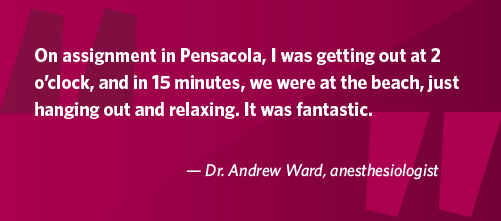For anesthesiologists Monica Dixon and Andrew Ward, working for someone else wasn’t working for them anymore. They both needed a change and discovering locum tenens allowed them to continue practicing medicine on their terms. Find out how they became locum tenens anesthesiologists and why their lives changed for the better.
Create your own schedule

For the last 16 months of her 15-year medical career, Dr. Monica Dixon has worked full time as a locum tenens anesthesiologist. “I haven’t looked back,” says Dr. Dixon. “I don’t think I’d ever go back to a traditional full-time job.”
Before transitioning to locum tenens, her employer notified her about a large anesthesia company absorbing them and — uninterested in working for the company — decided she needed a change.
“The next day, by providence or fate, my now-consultant cold called me from Weatherby,” she remembers. “I was in a position to think outside the box.”
She had concerns at first. There were concerns about giving up her health insurance, malpractice insurance, and matching 401(k). There were also questions if as a locum tenens anesthesiologist she’d make enough to cover the difference. After sharing these concerns with her consultant, though “He helped me with the negotiations to the point where I felt comfortable leaving full-time and going locums.”
As a locum tenens anesthesiologist, Dr. Dixon can now work a schedule suited to her goals and needs. “I didn’t lose anything because I am still earning an income as an anesthesiologist,” she reflects. “But now I have control of my life, which includes my family life, personal life, and work life.”

Dr. Dixon doesn’t work call, weekends, or holidays. She has every other Friday off, which she uses to drive to see her son. She says she feels better emotionally, mentally, and physically and now has a locum tenens contract to work for the same organization she started with 16 months ago through the end of 2023.
Travel across the country
Initially following a career path similar to Dr. Dixon’s, Dr. Andrew Ward also transitioned to working locum tenens for the first time in a 28-year career while maintaining a part-time job at a surgery center. Between the two jobs, he works full time but without weekend, on-call, or holiday work. “I plan to work part-time as a locum tenens anesthesiologist for four or five more years before retiring, but I enjoy the benefits of locum tenens so much that I can see myself working for quite some time.”
With his children out of the home, Dr. Ward prefers locum tenens employment in alternating locations. He is currently working a second locum tenens contract for a healthcare organization in Pensacola, FL. “My wife comes with me, which is nice,” he says. “The last time we were in Pensacola, I was getting out at 2 o’clock, and in 15 minutes, we were at the beach, just hanging out and relaxing. It was fantastic.”

A dose of beach life is only one of the travel-related perks he’s experienced as a locum tenens anesthesiologist. Dr. Ward has now worked tenens jobs in Chicago, Montana, Florida, and Wisconsin. He had a sister and brother-in-law visit in Pensacola, and in Montana, he went fly fishing with his brother at Glacier National Park. “Working locum tenens gives you a home base to get to know the place, and then people visit, see a new place, and you have some nice company.”
Across town or across the country: Learn how travel works for locum tenens
Provide care where it’s needed most

Healthcare organizations in smaller or rural communities have long relied on locum tenens anesthesiologists to fill gaps in coverage. Those challenges still exist today, creating ample opportunities for anesthesiologists to cover for physicians in rural settings who need support.
Locum physicians can also travel and earn higher hourly wages, all while having full malpractice coverage. These organizations understand how critical locum tenens anesthesiologists are to their operations.
“They’re always grateful for the support,” says Dr. Ward. “They’re thankful because they realize that they don’t have the bandwidth to get their work done if they don’t have the locum physician support. You’re very welcome, and if you’re a competent anesthesiologist, they’re more than happy to have you.”
Because of locum tenens, Dr. Ward is able to avoid long-term commitments to locations or organizations that are not a good fit. He initially only agrees to a six-week locums contract before deciding if he will extend.
Expand your skillset as an anesthesiologist
There are some unique challenges for locum tenens anesthesiologists. They need to learn new protocols, adapt to different equipment, chart differently, adjust to unfamiliar computer systems, and learn where everything is.
“When you work in the same hospital for 27 years, you get very comfortable with what everyone’s needs are, the patterns, how they do the surgery, timing, and things like that,” says Dr. Ward. “When you go to a new place, it’s all brand new.”
Although Dr. Ward acknowledges that adapting to a new workplace can be mentally challenging for the first week or two, he sees the upsides and says it gets easier with each new experience. “I find that it actually kind of refreshes you because it makes you think; it makes you jump, be more alert because you’re not so complacent as you were at the old place where you worked for years.”
Locum tenens anesthesiologists also work through an acclimation period with other medical professionals as they learn each other’s competencies and habits. “Sometimes, when you first arrive, some colleagues are a little wary because they have no idea what your skill level is. You also may not know what to expect at each new assignment,” observes Dr. Ward. “But for the most part, people have been very friendly and glad you’re there.”
Is locums right for you? Check out the pros and cons of locum tenens
Why anesthesiologists should consider locum tenens
For many anesthesiologists, the desire to control their schedule, provide care without the addition of administrative hassles, or travel to new places are all compelling reasons to give locum tenens a try.
Dr. Dixon recommends locums to other anesthesiologists. “If you’re looking for a job, try it for a little bit. If you don’t like it, you’re not locked in,” she says. “That was my thought process at the beginning, and I quit looking after the first few months. I have appreciated this more than I thought I would.”

To find out how else locum tenens can benefit an anesthesiologist career, contact a Weatherby Healthcare consultant at 954.343.3050 or view today’s anesthesiology job opportunities.